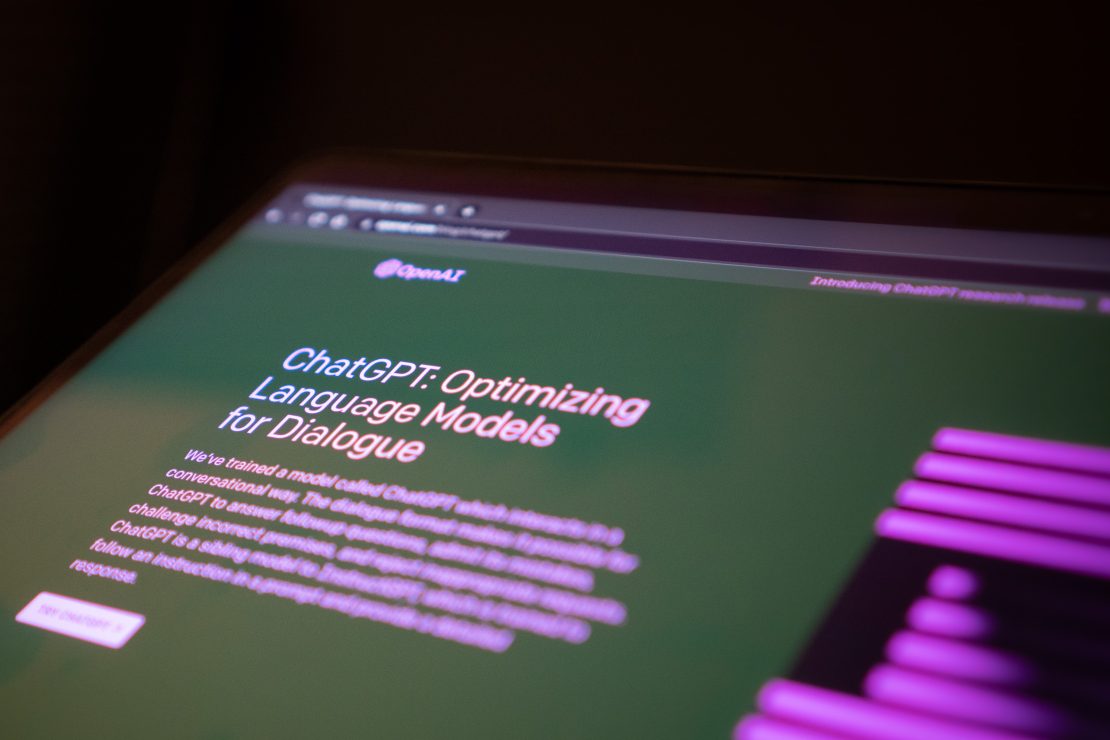Formal education should not be restricted to in-class assessment

Photo of ChatGPT’s website, photo by Jonathan Kemper.
Since ChatGPT became available to the public in November 2022, it has received plenty of attention. Many people hail it as an important step in artificial intelligence (AI) research and development. While ChatGPT is a step up from its predecessor, GPT-3, and other conversational AI software, not everyone is so enthusiastic — especially after Time Magazine’s exposé that revealed the exploitation, harm, and trauma experienced by underpaid Kenyan workers involved in the creation of its database.
A simple Google search reveals abundant headlines reporting university administration and professors are worried about the impact ChatGPT will have on student potential for academic dishonesty. This worry is something we see being discussed here at UVic.
Implicit in assignment grading, is the assumption that students are doing the work themselves. ChatGPT, currently a free-to-use application (with paid services appearing in some regions), can write essays and poems, and answer questions in short and long form. It has even averaged a C+ on some law school exams — “Cs get degrees!” With this potential to get passing grades on assignments, it is no surprise professors are worried about academic dishonesty on take-home assignments. Some professors and administrators muse about turning to purely in-class assessments and oral exams to avoid potential ChatGPT intrusions.
In December 2022, before my dissertation research turned toward ChatGPT, I wrote an opinion piece for the Martlet defending take-home assignments. I argued that in-person examination is unfair, unrealistic, and the strain on mental health is not worth it. Take-home assignments, on the other hand, are less anxiety-inducing, more realistic, and generally fairer. I feel it is necessary to remain steadfast in defence of take-home assignments. Because regardless of ChatGPT’s potential for cheating, take-home assignments are better for education and there is something about university education that eclipses any concern for academic dishonesty.
The emergence of ChatGPT highlights an ever-important question regarding the benefit of university education. Anyone who has gone to university has been asked, “Why are you going to university?” In our contemporary capitalist, career-centred world, the expected answer is: “To get a good-paying job/career.” This answer makes sense; statistically, university graduates make more money than non-graduates. However, this expectation is challenged by the increase in so-called “self-made” internet entrepreneurs — influencers and digital businesses. Making money without a formal education seems easier than ever. So, if the point of university education is a “good income” because you are not interested in achieving it via internet success, obviously, using ChatGPT to do your homework is the way to go.
However, there is a better argument for why students come to university: to learn how things are in specific fields of study and, more importantly, critical thinking. The problem is this view has been sidelined, and university professors often assume the mere existence of universities and their inherent benefit is enough. However, with students’ need for money and the emergence of ChatGPT, professors need to reorientate themselves and give serious attention to the benefits of university education. Moving away from take-home assignments because of ethical worries about ChatGPT fails to uphold the benefit of university education. Additionally, AI tools, like ChatGPT, can be powerful tools for education — we already see some professors incorporating ChatGPT into classrooms.
Furthermore, why learn from a professor when you can ask ChatGPT to distill information for you? Professors have a responsibility to “sell” the benefit of learning in a university classroom and doing the homework instead of, insultingly, placing all failure on student laziness. A move to in-person only assessment in response to ChatGPT insults students by telling them they cannot be trusted to honour academic integrity.
To “sell” the benefit of university education, professors must properly design their classes with attention to the assignments and readings. Classes need to situate readings properly. Assignments need to make sense, they need to develop from lectures and readings, and they need to encourage independent critical thinking. It is not enough to believe disseminating professional knowledge is inherently beneficial. Rather, it is what professors represent (which is not restricted to the humanities and social sciences): a dedication to questioning how things are and questioning socio-political conventions — refusing to accept that things are “good enough.”
Universities pride themselves on providing a robust, balanced education. All degrees require students to learn topics that appear unrelated to their major. In line with this balance, universities incorporate debate and dialogue with peers, mixed with deep thinking through independent reading and writing, and often beneficial are “practical” assessments through practicums, community-based projects, and artistic demonstration. Formal education should not be restricted, and we should stand steadfast regardless of AI intrusions.
Forcing students to only have in-class time for assessment robs them of the time and space needed for robust rumination.






